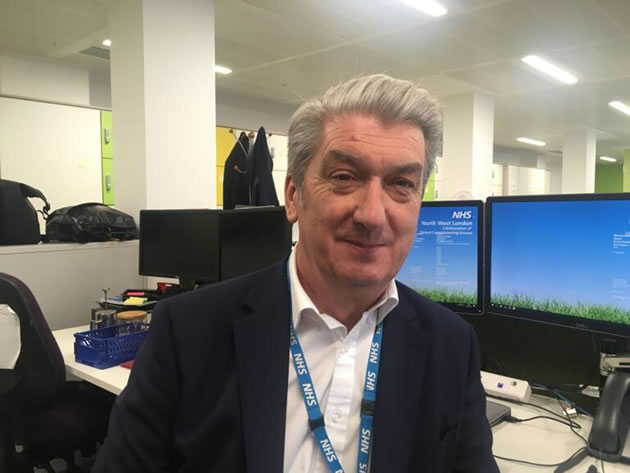Pandemic Has Revolutionised Local Health Care Says NHS Boss
Divisions between teams disappearing as they learn to work together

John Pullin. Picture: Julia Gregory
The way health bosses are working together to tackle the coronavirus pandemic is revolutionising the future of health care in North West London, says a health boss helping with the response.
Normally John Pullin would be busy looking after integrated care – bringing together the NHS and council to improve health and care in Hammersmith and Fulham.
But his experience as a former London emergency planning lead has helped colleagues respond to the coronavirus pandemic in North West London.
He wrote the plans to respond to the 2005 terror attack in London. Three years later he was part of the team responding to the flu pandemic. And he is encouraged by the way health bosses have worked together breaking down the barriers to respond to the current crisis.
He said: “It has enhanced the way we work together in a really productive way. We’ve shown that this is the way to work.”
And he said it gave hope for the future: “ I’m really optimistic that way of working will become the new normal when the dust finally settles because it’s been so encouraging to witness.
“The bridges that are being built are crucial in maintaining the momentum.”
He said he is seeing changes in how people working in different parts of the NHS in North West London are breaking down barriers because of the emergency.
His role at Hammersmith and Fulham Clinical Commissioning Group also includes Digital First – which looks at harnessing technology to help look after patients, including the Babylon GP at Hand appointments app which is based in West London.
However since the pandemic started he’s been using his expertise at the North West London Covid-19 co-ordination centre.
It covers the response hospitals, community services, mental health services and primary care.
He said it has used “well-rehearsed planning in civil contingency” to co-ordinate the long term response to the coronavirus pandemic.
It’s brought together key players and administrative support to help health bosses across North West London make key decisions about getting supplies and resources to the right place.
It includes sharing NHS England guidance, helping with conference calls and writing up action points and risk assessments.
And they gather data including infection and mortality rates to help people understand what’s going on.
A handful of people have worked at a distance in a large room at the co-ordination centre in Marylebone Road – and also from home.
The team has helped deploy people onto other essential work whilst their normal tasks such as running clinics are on hold, or those who were shielding but could work from home.
Mr Pullin said right now the teams are learning a lot about working together as they respond quickly to the pandemic – and he thinks that it has helped break down barriers.
He explained that the divide between commissioners and providers such as community trusts or mental health trusts “is disappearing because we are all working round the same table together”.
And the team has also been planning a response if there is a “second wave” of coronavirus.
“We’ve developed a robust, resilient infrastructure to support the response for the second wave,” he said.
Julia Gregory – Local Democracy Reporter
June 17, 2020